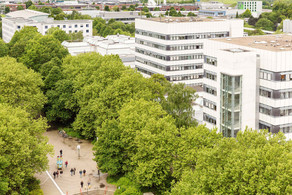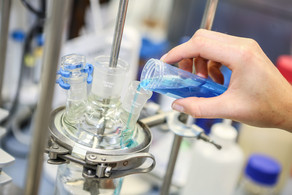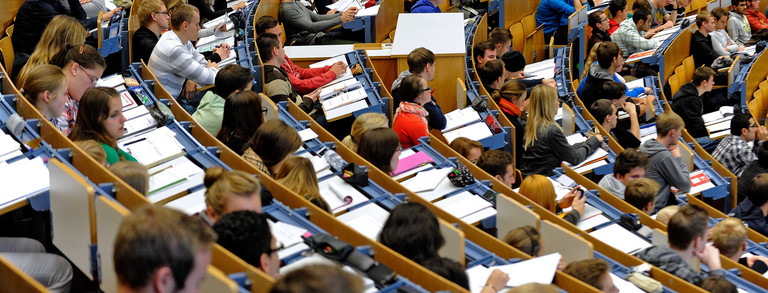Course Content
Fundamentals
- Basic structure of chemical production plants, compound structure of the chemical industry, difference between laboratory and production processes, characterization and representation of chemical processes in flow diagrams
- Engineering thermodynamics and kinetics
- Reactors: laboratory stirred tank (discontinuously or semi-continuously operated), heat removal from reactors, scale-up, safety aspects, continuously operated stirred tank, tubular reactor, stirred tank cascade, residence time
- Reactor design and process engineering using ammonia synthesis as an example, heterogeneous catalysis, use of ammonia
- Balancing of material and heat, basic cost accounting, optimization of chemical plants
- Distillation: laboratory distillation (operated discontinuously), rectification (as repeated, continuously operated distillation), balancing of a rectification column, McCabe-Thiele method, influence of the reflux ratio, technical designs
- Other basic thermal operations: Absorption (application example gas scrubbing in natural gas processing), adsorption, extraction, countercurrent principle as a common feature, technical design forms (tray and packed columns), basic mechanical operations (stirring, filtration), pumping
Processes
- Fossil raw materials (crude oil, natural gas, coal)
- Organic basic chemicals I (steam crackers)
- Organic basic chemicals II (C2 chemistry)
- Organic basic chemicals III (C3 to C5 and aromatics chemistry)
- Organic end products I (polymers)
- Organic end products II (detergents, dyes, pharmaceuticals, pesticides)
- Selected inorganic products: e.g. sulfuric acid, chlorine, caustic soda, cement, pig iron / steel, aluminum, semiconductor silicon
- Field trip to a chemical industry plant
Aquired competences
Desired learning outcomes
Upon successful completion of this module, students should be able to:
- Recognize the differences between the production of substances in the laboratory and on an industrial scale and consider them for application
- Apply the fundamentals of thermodynamics, phase equilibria, reaction kinetics, mass and heat transport, and mass and heat balancing to explain the operating principles of the major chemical reactors and separation processes
- Discuss the possible applications of the various basic types of chemical reactors
- Explain the action of heterogeneous and homogeneous catalysts and the reaction processes involved
- Carry out stage designs taking into account phase equilibria and mass balances as a basis for the design of separation processes
- Understand the design and function of essential equipment in chemical plants and describe their advantages and disadvantages for specific applications
- Describe a chemical process with the aid of a process flow diagram
- Explain the production of essential inorganic and organic precursors, intermediates and final products of the chemical industry using process flow diagrams
- Describe the processes carried out in the practical experiments including their industrial significance
- Explain the essential chemical / physico-chemical theoretical principles of the experiments
- Present the measurements carried out and their evaluation
- Discuss the large-scale designs and applications of the reaction and separation apparatus discussed in the practical course experiments
Key competencies taught
Essential skills for a successful career in the chemical industry are taught:
Methodological skills
- The ability to evaluate a chemical process not only from a chemical point of view but also from an engineering, equipment, economic and ecological point of view
- The combination of theoretical knowledge with practical experience from the internship
Social skills
- Learning about engineering issues improves the ability to work in a team with graduates of chemical engineering and other disciplines
- The execution and evaluation of the internship experiments in groups of three students promotes the ability to work in teams
Further Details
| Exam | Written - Duration not indicated in the Modulhandbuch zum Bachelorstudiengang Chemie |
| Preliminaries | Fundamentals of inorganic, organic, and physical chemistry. |
| Literature | D.W. Agar, A. Behr, J. Jörissen „Einführung in die Technische Chemie“, Spektrum Akademischer Verlag, Heidelberg, 2010. W. Reschetilowski „Technisch-Chemisches Praktikum“, Wiley-VCH, Weinheim, 2002. Praktikumsskripte der Technischen Chemie The slides of the course and any additional materials such as literature lists and website recommendations will be published in the virtual workrooms in Moodle provided for this purpose. Details will be announced at the beginning of the course. |
Only the information found in the LSF and the most recent edition of the Modulhandbuch der Fakultät Bio- und Chemieingenieurwesen is binding. The content on this page may not reflect the most up-to-date information.





